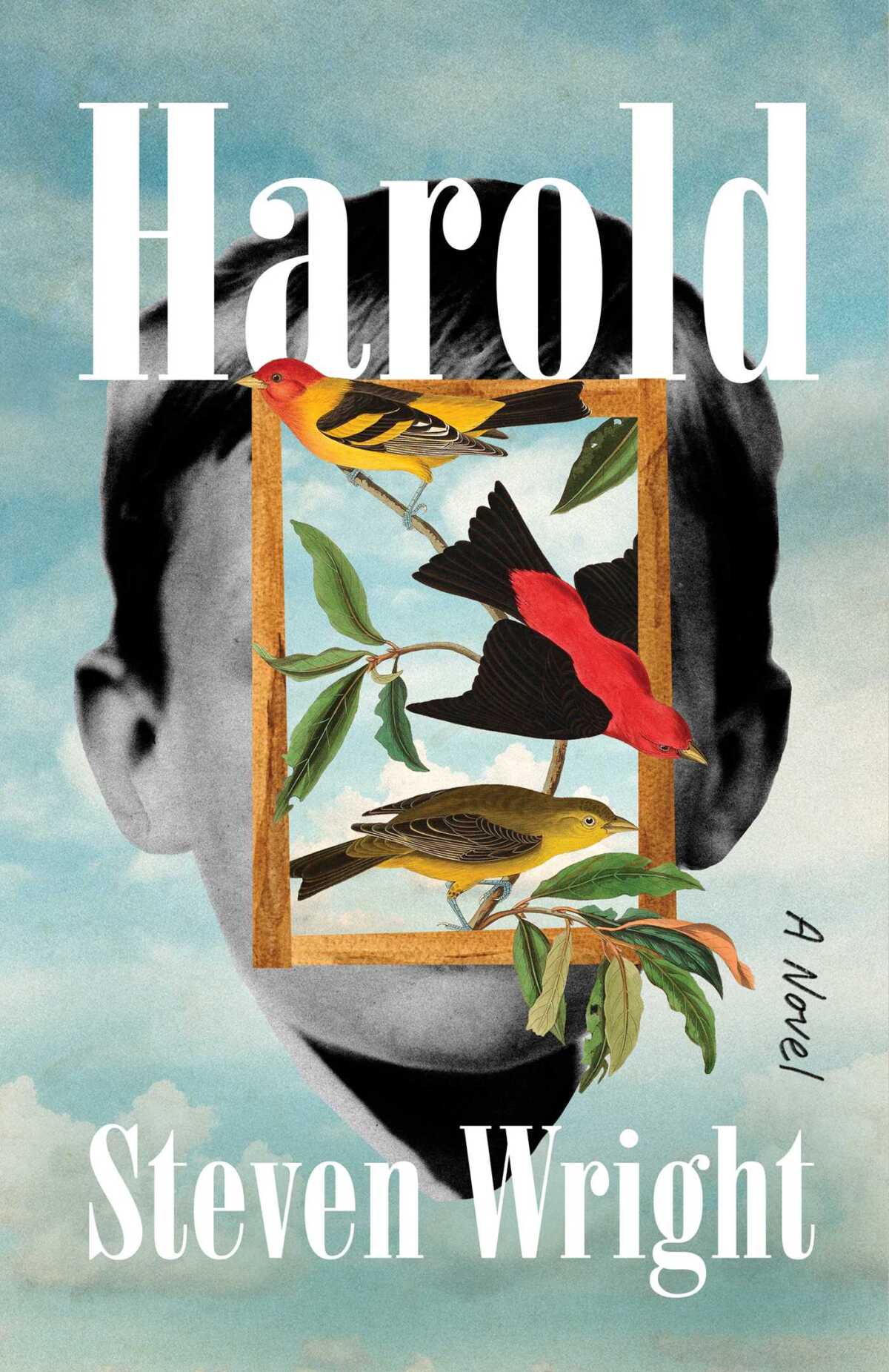Sign up for our Book Club newsletter
Get the latest news, events and more from the Los Angeles Times Book Club, and help us get L.A. reading and talking.
You may occasionally receive promotional content from the Los Angeles Times.

On the Shelf
Harold
By Steven Wright
Simon & Schuster: 256 pages, $26
If you buy books linked on our site, The Times may earn a commission from Bookshop.org, whose fees support independent bookstores.
If Kurt Vonnegut and “Calvin and Hobbes” creator Bill Watterson wrote a literary version of “Harold and the Purple Crayon,” they might have concocted an absurdist novel like “Harold.”
Or maybe, “Harold” could only have come from the off-kilter but fertile musings of stand-up legend Steven Wright.
Wright, for what it’s worth, has never heard of “Calvin and Hobbes” or seen the children’s books featuring that other Harold, but he calls Vonnegut “one of my heroes.”
He is equally admiring of coffee, which is thanked in the acknowledgments, telling me during our video interview, “I have a pretty good imagination but when I drink coffee I have a two-hour window that’s just …” before shaking his head in wonder. He lifts his mug into camera range. “Right now I’m high on coffee.”
Moore unpacks healthy boundaries, asking for what you need in a friendship, animals as friends, falling in love with a friend and even attachment styles.
Wright’s comedic style onstage is, famously, the opposite of caffeinated; his deadpan delivery elevated him to the top of the stand-up world in the 1980s with one-liners like these:
I spilled spot remover on my dog. Now he’s gone.
You can’t have everything. Where would you put it?
I used to work in a fire hydrant factory. You couldn’t park anywhere near the place.
Everywhere is walking distance if you’ve got the time.
It’s a small world, but I wouldn’t want to have to paint it.
That same originality and dry humor ricochets throughout his novel. Wright’s Harold is a third-grader stuck in class while his imagination soars and dives through a series of adventures and memories. We experience “the circus in his head,” as each new thought comes to him in the form of a small bird that flies through a rectangular window in the middle of his brain.
“I thought of that before I was even writing the book,” Wright recalls. “My mind is skipping around, going from one subject.”

Harold’s ideas are equally distinctive. Some definitely sound like Steven Wright jokes, as when Harold muses about why a needle would be in a haystack or asks his beleaguered teacher, “Do you happen to know the history of trick questions?” But the book also has other characters — childhood crush, a supportive grandfather — as well as a (warped) narrative of sorts, including a long dream sequence on the moon and a space visit with Carl Sagan.
Like Calvin, Harold has a vocabulary and an introspective streak unlike any 7-year-old’s; he ponders his existence, deciding in a Vonnegut-esque way that “the problem was he was smart enough to ask the question but not smart enough to answer it. Then he thought maybe that goes for the entire human race.”
In our interview, which has been edited for clarity and length, Wright exhibited that same kind of openness and curiosity, frequently turning questions around on me and happily veering off topic. He was also generous: When I attempted a Steven Wright joke — “I’m writing a new song about concentration struggles in the age of social media. The chords are just A, D, D” — he said, “I like that. You don’t see that coming and that’s the whole thing.”
Out with the essay collection ‘No One Asked For This,’ David talks candidly about nepotism, Pete Davidson and a terrifying, hilarious web of neuroses.
You wrote for yourself, with no plans to publish. Was that freeing?
I was just writing what was interesting to me. I was staying in my own world. I wasn’t looking at it from the outside wondering, “What would a publisher think of this?” I never judged it by how it would be seen. I think that would bend how it was written and it would take the fun of it away. It was very innocent, like a kid coloring.
There are quirky one-liners that fulfill a reader’s expectations of a Wright book, but they’re scattered. Were you careful about that?
I started writing thinking there’d be no jokes, but they just leaked out. I purposely spread it out, but if they came to me when I was writing I’d just put them in there. The reason I even started writing the book is that stand-up is like working through a very narrow window of creativity.
A rectangular window?
That’s funny. I didn’t even connect it. Maybe I’m obsessed with windows and don’t know it.
[He turns from the camera and looks behind him, gazing upon two amply-windowed walls in a silent deadpan.]
But with stand-up, the joke — a couple of sentences to get the audience laughing out loud — is a very specific type of creativity. I’m not complaining at all, but I had stuff in my head that was not in that window, so I started writing it.
Are Harold’s musings inspired by what you thought about as a kid?
No, it’s like I’m putting a funnel into the top of Harold’s head and I’m pouring into his head a lot of what I think about the experience of life.
But a kid is constantly wondering; he’s a wondering machine. And all art comes from noticing what’s around you. I notice things like a child does, except I get to use the words of an adult.
Harold’s grandfather offers him great and unusual insights. Were you shaped by someone like that when you were a boy?
Not really. But a grandparent to me is like a philosopher because of how long he has lived. I have stuff in my stand-up about a grandfather talking to a little kid; it just fascinates me. Their perspective has a common denominator, it’s like a circle with two doors and one going in and one going out. The grandfather is past all the BS and the kid hasn’t gotten to it yet.
Jim Carrey’s new semi-true novel, “Memoirs and Misinformation,” is unlike any show biz chronicle you’ve read.
At one point you randomly mention someone named Peter who, “many many years later,” will tell Harold “the purpose of life is to enjoy your life.” Who is Peter?
It’s a real line from a real guy. He’s an old friend of mine and he’s way older than me. He’s a very important person in my life. He said that to me about 25 years ago. And I said, “Wow.” It boiled everything down nicely. I never knew that was the purpose of life. But you’re asking me that question like you already knew that.
Well, I think from my grandparents I got both the lesson to enjoy life but also to give back and do good for others.
That’s fantastic.
Were you worried about the dream sequence on the moon being so long?
I didn’t see it as a risk because I was just having fun. One day I was describing him on the moon and it just kept going and going. I did wonder if you can have a dream go so long and I thought, “I don’t care.” It’s like a kid doing fingerpaints. He’s not saying, “Oh no, there’s too much green now.”
Harold feels unstuck in time. Parts seem to occur in the early or mid-‘60s, yet there’s a reference to “Helter Skelter” and Neil Armstrong and even Secretariat.
I was rounding off. I can’t be pinned down by time. There’s also the part where he’s talking about the photograph taken from the Voyager, which was in 1993, and I wrote, “In case you’re wondering how he knew about that, mind your own business.”
That’s so silly. And then I thought, “So what.” I just thought, “So what,” about almost everything.
Sign up for our Book Club newsletter
Get the latest news, events and more from the Los Angeles Times Book Club, and help us get L.A. reading and talking.
You may occasionally receive promotional content from the Los Angeles Times.